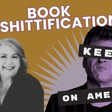
Women Lie Too: A Smug San Francisco Intellectual Cross-Examines a Fearlessly Authentic Florida Psychologist
We all have our roles. I’m the smug San Francisco intellectual and the Orlando-based Dr Chloe Carmichael is the fearlessly authentic psychologist. She’s also the author of Can I Say That?, a feisty defense of free speech in our time of cancellation and unfriending. Most of us are too scared to say what we think, Carmichael argues about this anxiety-ridden, intolerant age. Such self-censorship is damaging our mental health, she worries. Liberals are more likely to defriend people over political differences. And yes, women sometimes lie. Imagine that. I’m a touch skeptical about some of this psychologizing—particularly whether any Americans are truly being silenced. But the good Dr Chloe has the “data” (who doesn’t?), the slot on Fox, and the cheek to nail me as a smug San Francisco intellectual. Even if such straight talk nearly got her unfriended by an anonymous woke reviewer at Publishers Weekly. Probably another smug coastal elite. Can I say that?
1. The Mental Health Case for Free Speech Dr. Carmichael argues that self-censorship creates psychological harm—elevated cortisol, repression, and denial. She claims that when people can’t express themselves authentically, they either resort to violence, passive aggression, or damage their social relationships. Her clinical case: a client denied a promotion in favor of a woman who couldn’t process his anger directly and began unconsciously “acting out” distrust toward women in his life.
2. The “Five D’s” of Liberal Intolerance Carmichael presents data showing people who identify as liberal are statistically more likely to: defriend, disinvite speakers, decline to date, distance in real life, or drop contact altogether over political differences. She insists this isn’t “in the DNA” of liberalism—conservatives led censorship campaigns in the 1980s against rap music—but claims it’s the current snapshot. She argues liberals genuinely believe limiting speech reduces hate and misinformation, but it actually has the opposite effect.
3. The Violence Red Line Despite defending provocative speech (including Tucker Carlson interviewing neo-Nazi sympathizer Nick Fuentes), Carmichael draws a clear boundary: incitement to violence, fraud, defamation, and libel are not protected. She distinguishes between “viewpoint discrimination” (canceling someone for saying “a man can’t become a woman”) and legitimate social distancing from those celebrating political violence. She’s also fine keeping trans women out of her locker room.
4. The Skeptic Pushes Back Andrew remains unconvinced there’s actually a free speech crisis. He doesn’t see evidence of widespread self-censorship among his (mostly liberal) San Francisco friends, questions her survey data, and challenges her claim of political balance—pointing out she appears frequently on Fox but never on MSNBC or CNN. He suggests the Publishers Weekly reviewer might be right that her book is a “slanted polemic” with a conservative bias, despite her protests.
5. Dialogue, Not Deplatforming Carmichael’s most compelling example: Daryl Davis, the Black R&B musician who collecte


















